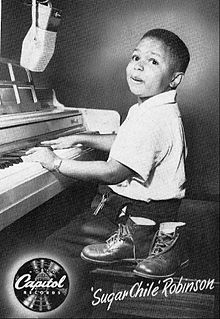Sugar Chile Robinson
| Sugar Chile Robinson | |
|---|---|

Robinson, ca. 1950
|
|
| Background information | |
| Birth name | Frank Isaac Robinson |
| Born |
December 28, 1938 Detroit, Michigan, U.S. |
| Genres | Blues, boogie-woogie |
| Occupation(s) | Musician |
| Instruments | Piano |
| Labels | Capitol Records |
Frank Isaac Robinson (born December 28, 1938), known in his early musical career as Sugar Chile Robinson, is an American jazz pianist and singer who became famous as a child prodigy.
Robinson was born in Detroit, Michigan. At an early age he showed unusual gifts singing the blues and accompanying himself on the piano. According to contemporary newsreels, he was self-taught and managed to use techniques including slapping the keys with elbows and fists. He won a talent show at the Paradise Theatre in Detroit at the age of three, and in 1945 played guest spots at the theatre with Lionel Hampton, who was prevented by child protection legislation from taking Robinson on tour with him. However, Robinson performed on radio with Hampton and Harry "The Hipster" Gibson, and also appeared as himself in the Hollywood film No Leave, No Love, starring Van Johnson and Keenan Wynn.
In 1946, he played for President Harry S. Truman at the White House Correspondents' Association Dinner, shouting out "How'm I Doin', Mr. President?" – which became his catchphrase – during his performance of "Caldonia". He was the first African American performer to appear at the annual WHCA dinner. He began touring major theaters, setting box office records in Detroit and California. In 1949 he was given special permission to join the American Federation of Musicians and record his first releases on Capitol Records, "Numbers Boogie" and "Caldonia", both reaching the Billboard R&B chart. In 1950, he toured and appeared on television with Count Basie and in a short film 'Sugar Chile' Robinson, Billie Holiday, Count Basie and His Sextet. The following year, he toured the UK, appearing at the London Palladium. He stopped recording in 1952, later explaining:
...
Wikipedia
